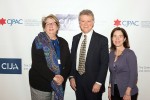The entire Jewish community was shocked to witness a spike in antisemitic vandalism in November, with incidents reported in Montreal and Toronto, and at three synagogues and a Jewish community centre, as well as at non-Jewish sites, in our nation’s capital.
The Centre for Israel and Jewish Affairs (CIJA) worked closely with targeted institutions and local police to ensure effective measures were taken to protect the community in Ottawa, and the police arrested a suspect who now faces serious criminal charges.
While these ugly crimes remind us that antisemitism – the world’s oldest hatred – still exists, solidarity demonstrated by many proves we are not alone in this battle. Countless leaders, including the prime minister, various members of Parliament, the mayor of Ottawa, police officials, the United Way, and leaders in the Christian, Sikh and Muslim communities, have denounced these incidents. In so doing, they have reminded us of the value of our efforts to build bridges with non-Jewish leaders and communities. Our voices are stronger when united in common cause. From the many communities whose interests, values, and concerns we share, I highlight just three recent examples of CIJA partnerships making an impact.
In October, CIJA was honored to meet with His Holiness Mirza Masroor Ahmad, caliph of the Ahmadiyya Muslim community. Numbering some 10 to 20 million globally, Ahmadis face persecution in much of the Muslim world. In Pakistan, they are denounced as “non-Muslim,” face systemic discrimination and are the target of harassment and terrorist attacks.
CIJA has built a relationship with the Ahmadiyya community of Canada, with whom we have established dialogue and joined in calling on the Canadian government to prioritize religious freedom abroad. The caliph (a non-political position) recently commented on the thriving Ahmadi community near Haifa and underscored his community’s belief in the need to respect all faiths. Canadian Ahmadiyya leaders have shared both their appreciation for Israel as the freest country in the Middle East and their opposition to boycotts targeting the Jewish state.
CIJA continues to enjoy warm friendships with several major Christian organizations, including the Canadian Conference of Catholic Bishops (CCCB), the Evangelical Fellowship of Canada and various mainstream Protestant denominations.
Last November, CIJA and the Canadian Rabbinic Caucus launched a partnership agreement with CCCB, including a shared commitment to join forces in countering antisemitism and hatred in all its forms. We’ve since worked with CCCB on issues as diverse as Holocaust commemoration, the persecution of Middle East Christians and – in a unique Jewish-Catholic-Evangelical-Muslim partnership – a campaign calling for a national, well-funded palliative care strategy. This latter issue is especially crucial given Canada’s aging population and evidence that far too many patients cannot access high-quality end-of-life care.
We have also mobilized the support of various Christian groups and others, including Sikhs and Muslims, in our effort to strengthen Canada’s hate crime laws. Currently, vandalism targeting places of worship is automatically treated as a hate crime with serious penalties, a designation not applied to incidents involving community centres and schools associated with an identifiable group. Working with our interfaith partners, we are urging MPs to support Bill C-305 to close this loophole in the Criminal Code.
And, while Canadian society has witnessed a generational shift regarding LGBTQ rights, many in this community continue to face bigotry. CIJA is proud to be part of the four-member executive committee overseeing Trans Equality Canada, a coalition leading the advocacy efforts for Bill C-16, which extends hate crime and anti-discrimination protections to the transgender community. This historic legislation passed the House of Commons in November and is now with the Senate.
CIJA’s role in this campaign is unique. We’re the only ethnic or religious community organization at the forefront of what is, arguably, the most important issue concerning the Canadian LGBTQ community today: the rights of transgender Canadians.
This work mirrors the efforts of local CIJA offices and grassroots Jewish groups across Canada building ties with their respective LGBTQ organizations and Pride festivals. For their work in Montreal, our team received an award from the LGBT Chamber of Commerce of Quebec.
These relationships don’t just advance human rights. They help ensure we have allies within the LGBTQ community when anti-Zionists attempt to import their bigoted agenda into Pride, just as, in October, Halifax Pride voted down a resolution to ban any mention of Israel from its events.
This is just a sample of the partnership work we’re doing to build a better society for the Jewish community and all Canadians. But it’s a work in progress, and there are countless communities with whom we will seek opportunities to strengthen ties through issues of common cause. If you have suggestions or would like to get involved, connect with us at info@cija.ca.
Shimon Koffler Fogel is chief executive officer of the Centre for Israel and Jewish Affairs.


